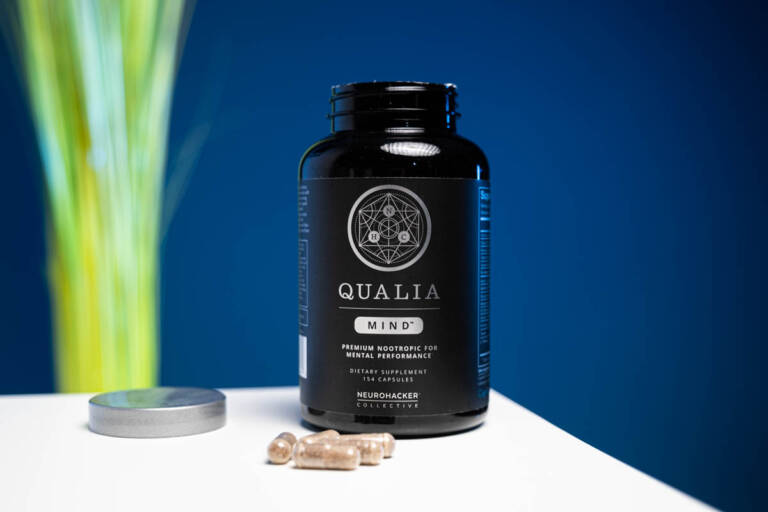Lion’s mane mushroom, also known as Hericium Erinaceus, is a medicinal mushroom with many potential health benefits. But since it is a mushroom, it’s often associated with “magic mushrooms” or psilocybin mushrooms which have psychedelic properties. Because of that association, lion’s mane mushroom is sometimes wrongly recognized as a drug.
This raises questions about the range of benefits of lion’s mane, possible side effects, and the potential of being addictive.

What Is Lion’s Mane Mushroom?
Lion’s mane mushroom is one of the most well-known medicinal mushrooms. It has a long history in traditional Chinese medicine. The name goes well with its look since it reminds of an actual lion’s mane. But it isn’t just the look that’s interesting; it is also its versatile use. It’s used not only as a supplement but can also be used in the kitchen.
In nature, you can find lion’s mane mainly on dead trees and logs.
Lion’s mane mushrooms contain many bioactive compounds, including antioxidants, that positively affect our brain health, cognitive function, and nervous system.
Beneficial Effects Of Lion’s Mane
Lion’s mane mushrooms have medicinal properties that are beneficial for various purposes. They can improve your cognitive performance, boost your mood and provide protection for your brain.
It Offers Protection Against Alzheimer’s Disease
Lion’s mane contains two compounds, hericenones, and erinacines, which support the growth of new brain cells. This is especially important as we age because the brain’s natural ability to grow and maintain healthy brain cells becomes increasingly limited, and our brain performance worsens.
Research on animals shows that lion’s mane mushrooms can protect against Alzheimer’s disease, which, in the long run, can cause complete memory loss. [*]
One particular study on older people with mild cognitive impairment also showed that Lion’s mane can help improve cognitive performance in a 16-week supplementation window. [*]
It Increases Nerve Growth Factor
Lion’s mane increases nerve growth factor (NGF), which is responsible for the healthy growth of new brain cells. A decrease in NGF can cause issues with cognitive function. Since you can’t directly supplement NGF, a nootropic like a lion’s mane mushroom can help you. [*]
It Can Reduce Anxiety And Depression
Lion’s mane also has the potential to reduce mild symptoms of anxiety and depression. There are various possible reasons for depression and anxiety, and inflammation may be one of them.
Studies show that the lion’s mane mushroom has anti-inflammatory effects, which can decrease anxiety and depression symptoms. [*]
What’s even more, unlike anti-depressants and other drugs, the possible side effects are minimal, and there is no risk of addiction.
It Has Antioxidant And Anti-Inflammatory Effects
As mentioned, lion’s mane has powerful antioxidant and anti-inflammatory effects, which is why it’s so beneficial for our brain and overall health. Chronic inflammation can cause many health issues, including cancer, autoimmune and cardiovascular diseases.
Lion’s mane has been shown to have the fourth most potent antioxidant effect amongst 14 species of mushroom. [*]
Studies also show that it has anti-inflammatory compounds and can significantly decrease inflammation markers. [*]
It Offers Protection Against Stomach Ulcers
Chronic inflammation, caused by the overgrowth of bacteria H. pylori, and nonsteroidal anti-inflammatory drugs have taken their part in increasing gastric ulcers. Ulcers are serious gastrointestinal diseases and should be treated carefully. The major cause of ulcers is the secretion of gastric acids, so the treatment mainly focuses on suppressing these. [*]
Research shows that the lion’s mane can protect against gastric ulcers by suppressing H. pylori growth. [*]
It Can Reduce The Risk Of Heart Disease
Two of the most known reasons for cardiovascular diseases are high triglycerides and obesity, which are very common nowadays.
Animal studies show that lion’s mane improves fat metabolism and decreases triglyceride levels, leading to a reduced risk for heart disease. [*]
Lion’s Mane Side Effects
There have been mainly animal studies that assessed the possible side effects of lion’s mane, and they showed that lion’s mane mushroom is generally safe, even when taking higher dosages.
However, some reported side effects of lion’s mane in people allergic to mushrooms have been reported. After all, this is still a mushroom, so it is better to avoid it if you have a mushroom allergy.
Can You Become Addicted To Lion’s Mane?
Lion’s mane is part of the medicinal mushrooms family and, as such, works completely different than drugs that you can build up some sort of dependency on.
There is no research that would show you can become addicted to lion’s mane mushroom, especially not in the sense of chemical addiction that would be harmful to your body.
Even more, a lion’s mane can provide several benefits for your brain health, mood, cognitive function, and overall well-being.
Lion’s Mane Optimal Dosage
Lion’s mane is available in many different forms, from teas to powder and drops, so you have many options to choose from if you want to start taking lion’s mane. You can even cook it or add it to some of your favorite recipes!
Human research on Lion’s mane mushroom is still in the early stage, so no standard optimal dosage is determined. However, existing research points to 500-1000 mg of lion’s mane taken one to three times daily, and the higher dosage ranges are from 300-3000 mg 1-3 times daily.
You can find lion’s mane in many great premade nootropic stacks, like Mind Lab Pro, or you can take it as an individual compound.
It is recommended to follow the label guidelines regarding the dosage and start with a lower dose to see how you feel.
Also, if you’re unsure about the synergies of taking lion’s mane and any drugs or medicine, it’s recommended to go for professional medical advice.
Verdict
Lion’s mane can offer excellent support for our brain and overall health. It has many benefits, minimal possible side effects (unless you’re allergic to mushrooms), and isn’t addictive. It’s generally safe to supplement and can be found in some of the best nootropic stacks.
Click below for a premade stack that contains the lion’s mane.






